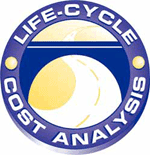U.S. Department of Transportation
Federal Highway Administration
1200 New Jersey Avenue, SE
Washington, DC 20590
202-366-4000
Focus
| Accelerating Infrastructure Innovations |
Publication Number: FHWA-HRT-06-029
Date: September 2006
As State transportation departments seek to examine the economic ramifications of their investment choices and make the best use of limited highway funding, they can turn to the Federal Highway Administration's (FHWA) Life-Cycle Cost Analysis (LCCA) team for technical support, training, and tools for conducting LCCA.
LCCA is a process for evaluating competing design alternatives by analyzing initial costs and discounted future costs over the life of the project segment, including preservation, maintenance, user, and rehabilitation costs. "This definition drives the team's mission statement, which is 'Investment decisions achieve cost-effective solutions for transportation infrastructure,'" says Nathaniel Coley, LCCA Program Manager in FHWA's Office of Asset Management.
The team has been active in recent months providing onsite support to States implementing LCCA intotheir programs. Team members visited the Georgia Department of Transportation (GDOT) in May 2006 to assist with technical issues encountered using FHWA's RealCost LCCA software, which is a tool for performing LCCA for pavement selection, and to help develop an LCCA implementation approach strategy. The team also recently visited the California Department of Transportation (Caltrans) to assist with a similar effort to develop an LCCA implementation strategy. Caltrans' efforts are being supported by a team from the University of California's Berkeley and Davis campuses. "These meetings represented a two-way exchange of ideas that sparked changes in the programs of the participating States as well as the objectives and goals of the FHWA team," says Coley.
 |  |
| Life-cycle cost analysis resources available from FHWA include case studies of State experiences. |
Building on the lessons learned from the State visits and data gathered by a recent LCCA survey conducted by the South Carolina Department of Transportation (SCDOT), an LCCA Peer Exchange has been planned for October 17-18, 2006, in Kansas City, Missouri. The SCDOT survey gathered responses from over 20 State transportation departments, revealing that many are currently conducting LCCA to evaluate project alternatives. The peer exchange will allow States interested in conducting LCCA to present research findings and discuss challenges, lessons learned, and needed enhancements to make the process more usable. FHWA will pay travel costs for State participants.
| LCCA is a process for evaluating competing design alternatives by analyzing initial costs and discounted future costs over the life of the project segment. |
The last LCCA peer exchange was held in 1993. Attended by over 70 professionals from across the country, it identified gaps in understanding analysis periods, calculating user costs, using performance models, ascertaining the usable lives of assets, and using the appropriate discount rates in LCCA. FHWA and others helped address these gaps by developing guidance on analysis periods, calculation of user costs, and the use of appropriate discount rates. Ongoing efforts by FHWA and several States are also continuing to define techniques for developing performance models to use in LCCA's activity timing strategies.
The LCCA team's current initiatives also include developing a distance learning course on LCCA that will be offered through FHWA's National Highway Institute (NHI) starting this fall. "The course will assist States that have limited travel and training budgets by providing employees with a foundation in LCCA," says Coley. It will provide an overview of the LCCA process, describe user costs and how to incorporate them, provide an understanding of how to account for risk, and offer strategies for implementing LCCA. Students who enroll in the 3-day course will be able to participate from their office computers through a combination of live instructor-led and self-paced sessions broadcast over the Web. The course is designed to minimize the time employees would be away from their typical duties. Day one of the course requires only 2 hours of live instructor-led training, while day two is a self-paced session with the material available for viewing at the participants' leisure, accommodating normal workday tasks. Day three requires 2 hours of instructor-led training to close out the workshop.
Participants who complete the NHI course and are interested in learning more about implementing LCCA or require technical support will soon have the option of participating in FHWA's Advanced RealCost Software Implementation Support Workshop. This workshop is currently being developed by the LCCA team to familiarize States with the RealCost LCCA software and its recent enhancements, as well as detail lessons learned from States who have implemented LCCA and strategies for identifying and locating data needed for an LCCA. Guidance will also be provided on customizing the RealCost software. "The new workshop will serve as a free onsite technical support session geared to describing how to tailor this flexible software tool to specific State needs while providing real-world examples of LCCA," says Coley.
Additional initiatives underway by FHWA's Office of Asset Management to expand the application of LCCA include updating FHWA's LCCA Technical Bulletin; developing a new version of the RealCost software; developing case studies on State efforts to implement LCCA; and preparing guidance on using LCCA to evaluate design, maintenance, and preservation strategies for various highway assets.
The FHWA RealCost LCCA software, current LCCA Technical Bulletin, case studies, and other LCCA resources are available online at www.fhwa.dot.gov/infrastructure/asstmgmt/lcca.htm. For more information on LCCA methods, the new NHI distance learning course, RealCost software, and the Peer Exchange, contact Nathaniel Coley at FHWA, 202-366-2171 (email: nathaniel.coley@fhwa.dot.gov).